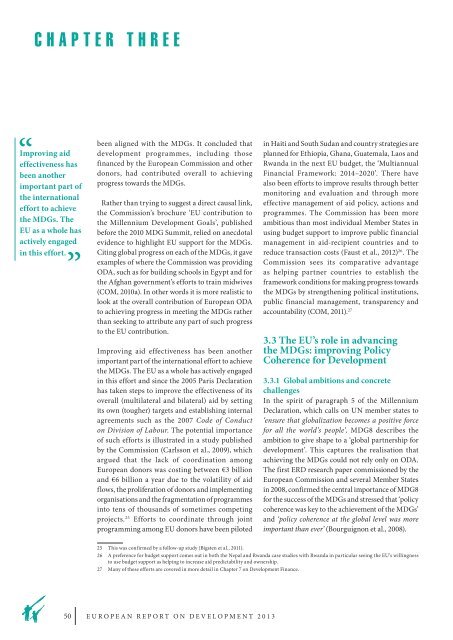Post 2015: Global Action for an Inclusive and Sustainable Future
Post 2015: Global Action for an Inclusive and Sustainable Future
Post 2015: Global Action for an Inclusive and Sustainable Future
Create successful ePaper yourself
Turn your PDF publications into a flip-book with our unique Google optimized e-Paper software.
CHApTER THREE<br />
Improving aid<br />
effectiveness has<br />
been <strong>an</strong>other<br />
import<strong>an</strong>t part of<br />
the international<br />
ef<strong>for</strong>t to achieve<br />
the MDGs. The<br />
EU as a whole has<br />
actively engaged<br />
in this ef<strong>for</strong>t.<br />
50<br />
been aligned with the mDGs. It concluded that<br />
development programmes, including those<br />
fin<strong>an</strong>ced by the Europe<strong>an</strong> commission <strong>an</strong>d other<br />
donors, had contributed overall to achieving<br />
progress towards the mDGs.<br />
rather th<strong>an</strong> trying to suggest a direct causal link,<br />
the commission’s brochure ‘Eu contribution to<br />
the millennium Development Goals’, published<br />
be<strong>for</strong>e the 2010 mDG Summit, relied on <strong>an</strong>ecdotal<br />
evidence to highlight Eu support <strong>for</strong> the mDGs.<br />
citing global progress on each of the mDGs, it gave<br />
examples of where the commission was providing<br />
oDa, such as <strong>for</strong> building schools in Egypt <strong>an</strong>d <strong>for</strong><br />
the afgh<strong>an</strong> government’s ef<strong>for</strong>ts to train midwives<br />
(com, 2010a). In other words it is more realistic to<br />
look at the overall contribution of Europe<strong>an</strong> oDa<br />
to achieving progress in meeting the mDGs rather<br />
th<strong>an</strong> seeking to attribute <strong>an</strong>y part of such progress<br />
to the Eu contribution.<br />
Improving aid effectiveness has been <strong>an</strong>other<br />
import<strong>an</strong>t part of the international ef<strong>for</strong>t to achieve<br />
the mDGs. the Eu as a whole has actively engaged<br />
in this ef<strong>for</strong>t <strong>an</strong>d since the 2005 paris Declaration<br />
has taken steps to improve the effectiveness of its<br />
overall (multilateral <strong>an</strong>d bilateral) aid by setting<br />
its own (tougher) targets <strong>an</strong>d establishing internal<br />
agreements such as the 2007 Code of Conduct<br />
on Division of Labour. the potential import<strong>an</strong>ce<br />
of such ef<strong>for</strong>ts is illustrated in a study published<br />
by the commission (carlsson et al., 2009), which<br />
argued that the lack of coordination among<br />
Europe<strong>an</strong> donors was costing between €3 billion<br />
<strong>an</strong>d €6 billion a year due to the volatility of aid<br />
flows, the proliferation of donors <strong>an</strong>d implementing<br />
org<strong>an</strong>isations <strong>an</strong>d the fragmentation of programmes<br />
into tens of thous<strong>an</strong>ds of sometimes competing<br />
projects. 25 Ef<strong>for</strong>ts to coordinate through joint<br />
programming among Eu donors have been piloted<br />
EuropE<strong>an</strong> rEport on DEvElopmEnt 2013<br />
in Haiti <strong>an</strong>d South Sud<strong>an</strong> <strong>an</strong>d country strategies are<br />
pl<strong>an</strong>ned <strong>for</strong> Ethiopia, Gh<strong>an</strong>a, Guatemala, laos <strong>an</strong>d<br />
rw<strong>an</strong>da in the next Eu budget, the ‘multi<strong>an</strong>nual<br />
Fin<strong>an</strong>cial Framework: 2014–2020’. there have<br />
also been ef<strong>for</strong>ts to improve results through better<br />
monitoring <strong>an</strong>d evaluation <strong>an</strong>d through more<br />
effective m<strong>an</strong>agement of aid policy, actions <strong>an</strong>d<br />
programmes. the commission has been more<br />
ambitious th<strong>an</strong> most individual member States in<br />
using budget support to improve public fin<strong>an</strong>cial<br />
m<strong>an</strong>agement in aid-recipient countries <strong>an</strong>d to<br />
reduce tr<strong>an</strong>saction costs (Faust et al., 2012) 26 . the<br />
commission sees its comparative adv<strong>an</strong>tage<br />
as helping partner countries to establish the<br />
framework conditions <strong>for</strong> making progress towards<br />
the mDGs by strengthening political institutions,<br />
public fin<strong>an</strong>cial m<strong>an</strong>agement, tr<strong>an</strong>sparency <strong>an</strong>d<br />
accountability (com, 2011). 27<br />
3.3 The EU’s role in adv<strong>an</strong>cing<br />
the MDGs: improving Policy<br />
Coherence <strong>for</strong> Development<br />
3.3.1 <strong>Global</strong> ambitions <strong>an</strong>d concrete<br />
challenges<br />
In the spirit of paragraph 5 of the millennium<br />
Declaration, which calls on un member states to<br />
‘ensure that globalization becomes a positive <strong>for</strong>ce<br />
<strong>for</strong> all the world’s people’, mDG8 describes the<br />
ambition to give shape to a ‘global partnership <strong>for</strong><br />
development’. this captures the realisation that<br />
achieving the mDGs could not rely only on oDa.<br />
the first ErD research paper commissioned by the<br />
Europe<strong>an</strong> commission <strong>an</strong>d several member States<br />
in 2008, confirmed the central import<strong>an</strong>ce of mDG8<br />
<strong>for</strong> the success of the mDGs <strong>an</strong>d stressed that ‘policy<br />
coherence was key to the achievement of the mDGs’<br />
<strong>an</strong>d ‘policy coherence at the global level was more<br />
import<strong>an</strong>t th<strong>an</strong> ever’ (bourguignon et al., 2008).<br />
25 this was confirmed by a follow-up study (bigsten et al., 2011).<br />
26 a preference <strong>for</strong> budget support comes out in both the nepal <strong>an</strong>d rw<strong>an</strong>da case studies with rw<strong>an</strong>da in particular seeing the Eu’s willingness<br />
to use budget support as helping to increase aid predictability <strong>an</strong>d ownership.<br />
27 m<strong>an</strong>y of these ef<strong>for</strong>ts are covered in more detail in chapter 7 on Development Fin<strong>an</strong>ce.

















